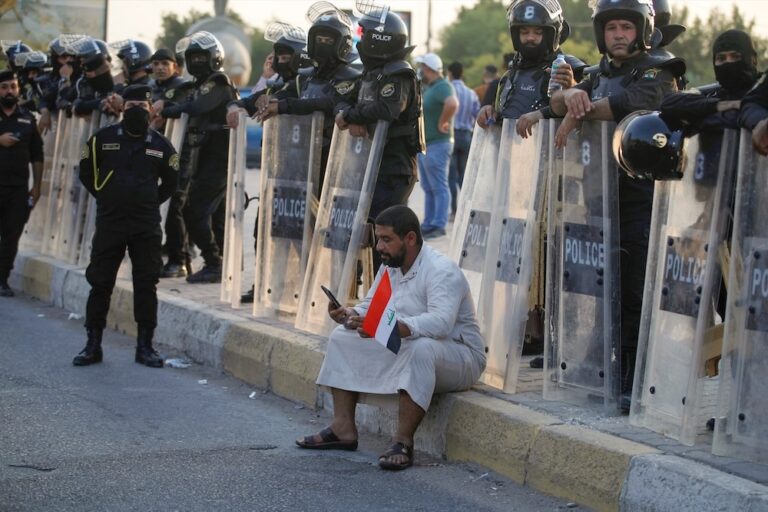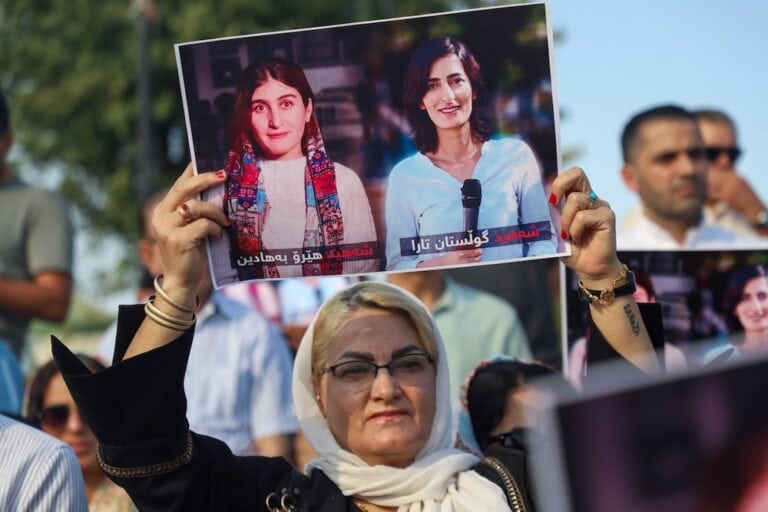(RSF/IFEX) – RSF has voiced alarm over the arrests of five journalists in the past two weeks. “We are very worried about the increase in arrests of local journalists, often without any evidence, or for unknown reasons. Iraqi journalists now have to deal with this new problem, in which their employers are often powerless to […]
(RSF/IFEX) – RSF has voiced alarm over the arrests of five journalists in the past two weeks. “We are very worried about the increase in arrests of local journalists, often without any evidence, or for unknown reasons. Iraqi journalists now have to deal with this new problem, in which their employers are often powerless to act. Both employers and family members must be given an explanation for such arrests,” the organisation said.
“We appeal to the Iraqi authorities to be more discerning and restrained, and to avoid carrying out hasty and arbitrary arrests. The police have sometimes behaved in a completely unacceptable fashion, both in the beatings meted out to a Reuters cameraman and two of his assistants, and in exorbitant bail requests that are tantamount to extortion,” RSF added.
The organisation called on the Iraqi authorities to put an end to such “disgraceful practices” and to either quickly produce evidence to back up their allegations or release the journalists.
The first journalist targeted in the latest wave of arrests was Hussein Al Shimari, a reporter with the satellite television station Al-Diyar. On 9 April 2005, he was detained by Iraqi soldiers in Dyala province, northeast of Baghdad, on suspicion of collaborating with insurgents. His editor said he was tortured. He has not been allowed to contact his family, nor have they received any word of him since his arrest.
On 12 April, the mayor of the southern city of Kawit ordered the arrest of Ayad Altmimi, editor-in-chief of the daily “Sada Wasit”, and journalist Ahmed Mutare Abass. Ibrahim Al-Srage, of IJRDA, an organisation that defends Iraqi journalists, said the mayor sought an arrest warrant from his cousin, the town’s public prosecutor, who responded by sentencing Altmimi to two months in prison and Abass to four months in prison for libel. The newspaper had carried reports about ongoing insecurity in the city and the municipal authorities’ shortcomings.
On 20 April, several policemen burst into the home of freelance cameraman Hassan Walid Abdul Wahab, 23, who works for the German television station Zweites Deutsches Fernsehen (ZDF). They arrested him, his two brothers (who do not work for the news media) and his father, a retired cinema operator in his 50s who was recently hospitalised with heart problems. A relative said the police accused Wahab of having links with the abductors of three Romanian journalists. On 26 April, after relatives repeatedly asked to visit the detainees, the police requested payment of US$10,000 in bail.
On 24 April, police arrested Reuters Television cameraman Nabil Hussein in the northern city of Mosul (see IFEX alert of 26 April 2005). Reached by telephone, Reuters spokesperson Susan Allsopp told RSF that police had not indicated if he was charged. According to Reuters, Hussein’s father was also arrested when he tried to visit his son a few hours after his arrest.
Describing the original arrest, relatives told Reuters that about 20 police officers raided the journalist’s home in the morning, beating Hussein, another journalist and their driver, before taking them to Mosul police headquarters. The driver, Ismail Ibrahim, said police “put sacks on [their] heads and beat [them].”
Reuters global managing editor David Schlesinger said he was very concerned about the arrests and called for the immediate release of Hussein and his father. “We are anxious to establish why our cameraman is being held and what if any charges have been brought,” he said. On 26 April, Reuters said it was still awaiting further news of the situation.


